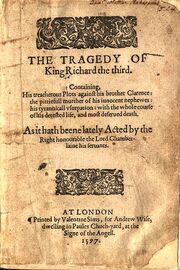
Richard III is a play by William Shakespeare, believed to have been written in approximately 1591, depicting the Machiavellian rise to power and subsequent short reign of King Richard III of England. It is probably one of Shakespeare's earliest plays, and is classified alternatively as a tragedy and as a history.
Shakespeare depicts Richard as a physically deformed man whose body matches his twisted soul. Upon the rise of his brother, Edward IV, to the crown, Richard is "determined to prove a villain", and systematically begins dispatching his enemies, all the while using his skills of flattery and charisma to charm them until it is too late. His victims include his other brother, the Duke of Clarence (whose death brings about the grieving king's death); the Queen's family; his nephews, the child king Edward V and his brother; various nobles who stand in his way, and; even his formerly staunch ally, the Duke of Buckingham. When his wife, Anne Neville dies, he seeks to wed the daughter of the former Queen.
Soon, Richard's unpopularity leads to his overthrow at the hands of Henry Tudor, the Earl of Richmond. Only on the eve of his death does Richard's conscience finally speak to him, as he dreams of the ghosts of his victims cursing him, and blessing Richmond, who triumphs in battle and takes the throne as Henry VII.
Much of Shakespeare's characterization of Richard is now generally disputed. While Richard was probably quite ruthless, it is doubtful that he committed quite as many crimes as Shakespeare attributed to him. The writing of the play fell during the reign of Queen Elizabeth I, granddaughter of Henry VII, and so Shakespeare had to play politics. But the standard histories of Richard at that time also depicted him as an inhuman monster.
While historically inaccurate, the character of Richard III has been nominated by numerous scholars as one of the most engaging, entertaining, and eloquent villains of English literature.
Richard III in Ruled Britannia[]
Richard III was unique among William Shakespeare plays in that he successfully convinced the Spanish authorities governing occupied England to allow him to write about an English king. This was entirely due to the fact that Shakespeare portrayed Richard as a "villain black"; had he portrayed Richard nobly, Shakespeare would have been accused of treason.
During his first meeting with Sir William Cecil, Shakespeare quoted the opening lines of the play "Now is the winter of our discontent." Cecil immediately recognised the source, and then used that line to apply to the situation at hand: the planned overthrow of Spanish occupation.
| |||||||||||||||||||
